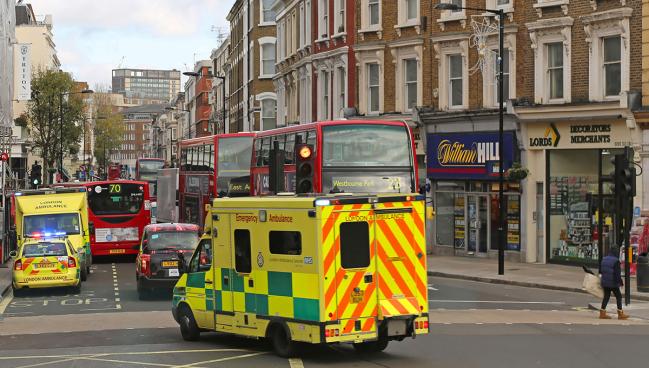In the UK, Quarrels Continue Over PA Scope Creep
There’s still time for cardiologists to get involved: regulatory details are still being finalized before the GMC takes over.

Big changes to how the United Kingdom regulates physician associates (PAs) are mere months away, with the General Medical Council (GMC) set to take over their registration in December 2024. Many physicians, including cardiologists, are continuing to raise alarm bells over “scope creep” and worries that there aren’t enough measures in place to avoid putting patient safety at risk.
The Royal College of Physicians (RCP) recently closed the comment period for its draft guidance that sets forth principles on the role of PAs in providing care. The document had been sent to government departments and National Health Service (NHS) organizations across the UK, the GMC, the British Medical Association (BMA), and various professional organizations for input. Next up will be an RCP-hosted roundtable on September 26, where physician-led specialist societies and royal colleges will provide feedback on how to reduce variation in scope, increase safety, and improve training for early-career doctors.
All of this back and forth stands to impact both the medical profession and the public.
Benoy Shah, MBBS, MD (University Hospital Southampton NHS Foundation Trust, England), speaking with TCTMD, pointed out that it’s not just a matter of patient safety, but one of health equity. A recent article in the Financial Times delves into the rapid growth of PAs that’s occurring across the United Kingdom, but to a greater degree in more socioeconomically deprived regions, potentially worsening access to qualified care.
“This is terrible, because it just increases healthcare inequalities further,” said Shah. “These are already deprived areas and then they're not able to recruit fully qualified doctors or they don't have sufficient fully qualified doctors, so are going to have assistants or associates instead.”
Admittedly, he said, “doctors aren't perfect—we get things wrong, we may miss something that could have major consequences—but at least you know you saw the most qualified person you could. If you see a physician associate and you come to harm, you're obviously going to think, well, in another part of the country I might have seen a qualified doctor.”
In case they've got it wrong and they've missed something, am I going to be the one that ends up in court if there's some big problem? Benoy Shah
He said that in its current form, the guidance doesn’t go far enough. To start, it doesn’t mention who the authors are—a big red flag for Shah. But within the RCP document, too, there are other worrisome details, he said.
For example, under the section “Patient Safety,” there’s a paragraph stating: “PAs are responsible for their own practice, although they will always work under the supervision of a consultant, GP, or specialist/associate specialist, who retains clinical and professional responsibility for patients treated under their care.”
“That's really not clear,” said Shah. “One of the big concerns that [doctors] have is: do I need to go and repeat the assessment that the physician associate did? Because in case they've got it wrong and they've missed something, am I going to be the one that ends up in court if there's some big problem?”
He added: “Doctors have always been ultimately responsible for their patients, but we've never had a group of different healthcare professionals (ie, not our younger medical colleagues) before who are being asked do what we do—take a history, examine the patient, formulate a differential diagnosis and a management plan—but without the same level of training or clinical experience.”
For Shah, the section entitled “Supervision” also raises eyebrows, as it describes three different levels of possible supervision for PAs: direct, indirect, and remote. Exactly what each of these means, and when they apply, is confusing, he said.
With direct supervision, there’s the worry that it will take a large time commitment on the part of already strained senior doctors, Shah pointed out. “They’ve written in this draft document that all the extra time required needs to be recognized in the doctor's job plan so that they're appropriately remunerated. That just does not happen: no one is going to see their salary increase so that they can directly supervise physician associates.”
What’s expected from PAs regarding expertise is also unrealistic, he noted. The RCP guidance lists skills like being able to “formulate and document a differential diagnosis, having taken a history and completed a physical examination” and “formulate and document a differential diagnosis, having taken a history and completed a physical examination,” as well as “recognize life-threatening and emergency situations and escalate care appropriately.”
All of those skills, he said, go far beyond what was initially envisioned for these associate positions. A big goal when expanding scope for PAs was to lessen some of the “grunt work” for doctors, said Shah, but the expertise described in this document is not “menial tasks.”
Shah also highlighted that PAs “themselves probably feel under fire right now, though most have done nothing wrong and simply taken opportunities presented to them.” He specified that the failure to provide regulation up front, define scope of practice, and ensure that these new roles wouldn’t adversely affect training for junior doctors lies mainly with the GMC, NHS, and royal colleges.
This uncertainty is happening on the backdrop of the RCP’s recent announcement that the group would no longer host the Faculty of Physician Associates once the GMC becomes the regulatory body for medical associate professionals. According to a press release, in an effort to provide oversight of patient safety, the RCP Assessment Unit will continue to deliver the national exam for PAs for the next 4 years.
Asif Qasim, MBBChir, PhD (King's College Hospital, London, England), agreed that the draft guidance falls short, pointing out that it follows an earlier, “fairly robust” document from the BMA.
“I think there's a general feeling that [the RCP] document should not have gone out to stakeholders and is not robust enough,” he told TCTMD. “And I think there are actions in play at the Royal College of Physicians to try and produce a more appropriate . . . document ahead of the 13th of December when” the GMC’s new legislation kicks in.
🧵/
— Dr Rachel Clarke (@doctor_oxford) September 18, 2024
This is, I believe, unprecedented in the history of UK medicine.
28 eminent UK doctors have written publicly to @LaylaMoran, the new chair of @CommonsHealth, to report something nothing less than scandalous.
Read their letter here (1/n) 👇https://t.co/qh5iZj7Xnj
In the meantime, advocates for tighter standards in the UK are approaching the issue from various directions.
The Royal College of Anaesthetists, for instance, is working on its own “scope of practice” document. And the BMJ recently published a letter by Qasim and colleagues across multiple specialties highlighting a report from the King’s Fund that identifies “a range of collective failures in leadership” on the part of the RCP—this summer, perhaps as a result of this turmoil, an effort by several RCP leaders successfully led to the resignation of the group’s president, cardiologist Sarah Clarke, MD.
More broadly, “there is widespread concern amongst physicians and doctors generally in the UK, the General Medical Council is not listening to them,” said Qasim. “It's not entirely clear, aside from the GMC being legally able to register PAs come December, who will be responsible for anything else beyond that,” he added.
So far it seems that scope will be determined locally, but “what has happened to date with local scope is that NHS trusts, who are pressed for staff and short of money, have deployed PAs in all sorts of places,” Qasim said. From survey data and staffing patterns, he noted, it’s clear that PAs are doing the work of physicians at many NHS hospitals, and beyond that there are thousands of PAs in general practice working as first-line care providers.
“It's not entirely clear who will deal with that. . . . What we certainly don't have is specialty by specialty scope [standards]” that provide specifics on what PAs can and can’t do in each medical setting, said Qasim. He pointed out that the RCP has had since 2015, when it began hosting the Faculty of Physician Associates (then called physician assistants), to come up with a plan—but it hasn’t.
These shifts in who is providing care—and how—are “a politically driven activity to rapidly expand the PA workforce to deliver medical care,” he stressed. “But it's not safe. It's not proven to be cost-effective. It's not proven to at least maintain clinical outcomes.”
We need to engage the public—as soon as the public hears that they're replacing doctors with people who've had 2 years clinical training and no medical degree, they're horrified. Asif Qasim
Guidance documents can only go so far in addressing this issue: they aren’t legally binding but instead are only recommendations, said Qasim. To make change, he advised, “I think we need to engage the public—as soon as the public hears that they're replacing doctors with people who've had 2 years clinical training and no medical degree, they're horrified.”
“The way forward is actually getting involved,” said Shah. “Stay active and stay vocal.”
Though the current debates apply mainly to the UK, scope creep is a concern in many countries. In the United States, where medicine is a licensed profession that’s regulated at the state level, the American Medical Association has been advocating against the trend, while the American College of Cardiology issued a 2015 health policy statement that envisioned how advanced practice providers might participate in team-based care. The Australian Medical Association, in 2023, released its own report exploring how best to prevent “inappropriate” scope creep.
Caitlin E. Cox is Executive Editor of TCTMD and Associate Director, Editorial Content at the Cardiovascular Research Foundation. She produces the…
Read Full Bio





Comments